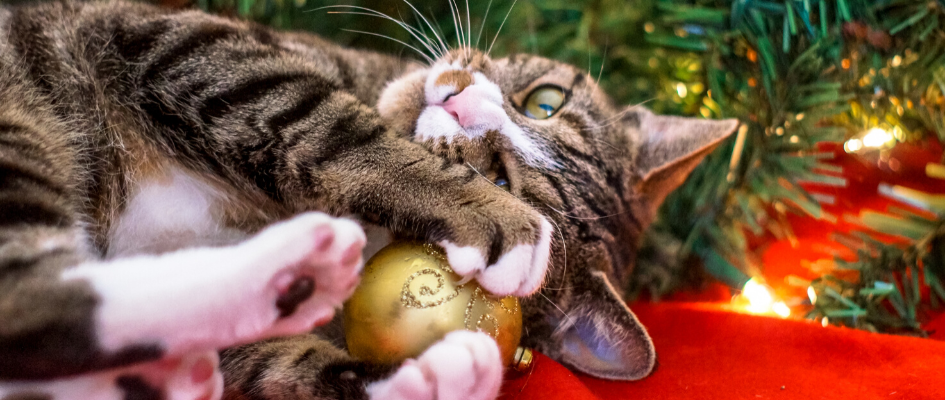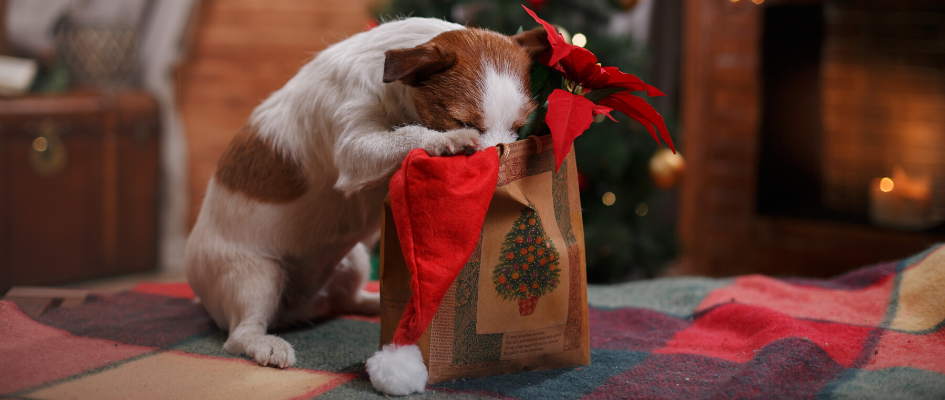Do you know the pet dangers hiding on your Christmas shopping list?
Human Medication
In the run up to Christmas, many of us may be reaching for the ibuprofen or paracetamol to cure a fuzzy head. Make sure to keep human medication away from your pets — dogs and cats are very sensitive to the effects, much more so than us. Many over the counter and prescription drugs, whilst beneficial for us, can be very harmful or even deadly to pets even in small doses. Always consult your vet for advice before giving any medication to your pet.
Xylitol
Could your good intentions be unintentionally harmful to your dog?
Xylitol is often used in baked goods around Christmas time in an effort to fight the festive flab. However, it is extremely toxic to dogs if ingested, even a small amount can be fatal. Xylitol (also known as E967) can be found in many products including sweets, baked goods, jams, peanut butter, dental hygiene products, chewing gum, etc. Ingestion in dogs causes a rapid drop in blood sugar which can lead to lethargy, wobbliness, confusion, vomiting, collapse and tremors/seizures. Some dogs may also go on to develop acute liver failure. Cats luckily do not appear to be affected.
Batteries
It’s time to wrap those Christmas toys and gadgets – don’t forget the batteries! However, pets are inquisitive and may think nothing about swallowing batteries, which can cause significant damage to the mouth and gastrointestinal tract! Large, chewed or punctured alkaline batteries often require intervention, and the lithium disc or ‘button’ batteries pose the greatest risk of all. Always contact your vet if you think your pet may have ingested a battery.

Mouldy Food
Mould ingestion can be lethal to pets. It usually happens when dogs raid the kitchen waste recycling caddy, so keep them out of reach this Christmas period where there is likely to be an increase in food waste. If your pet ingests mouldy food seek treatment without delay. Symptoms can occur rapidly and include:
- restlessness
- panting
- excessive salivation
- whole-body muscle tremors
- hypersensitivity to touch/noise
- seizures
Plants
Many Yule time plants can be hazardous to pets if chewed — luckily in the majority of cases symptoms are mild and self-limiting and may include salivation, oral irritation and vomiting/diarrhoea. To be on the safe side, keep plants out of reach of inquisitive pets and consult your vet if ingestion does occur.
Decorations
If you are decorating your Christmas tree this weekend beware of the potential dangers to your pet. Pets can be attracted to shiny lights, tinsel and baubles! Swallowed or chewed decorations can lead to cuts or intestinal blockages, and chewed fairy lights can pose an electrocution risk.

Salt
Homemade salt dough decorations are pretty but poisonous! You might be decorating your Christmas tree this weekend, but these decorations can be hazardous for inquisitive pets. Due to the high levels of salt needed to make salt dough, ingestion of just one of these homemade decorations is enough to cause serious poisoning. Symptoms can range from vomiting, diarrhoea, decreased appetite, lethargy, incoordination, excessive thirst or urination. In severe cases, tremors, seizures, coma, and even death are possible. Please avoid putting these around your home at Xmas if you have pets.
Onions and Garlic
Did you know that onions and their relatives are toxic to dogs and cats?
The Allium family (onions, garlic, spring onions, chives, leeks etc) cause red blood cell destruction in cats and dogs — which can result in lethargy or collapse. Even 1 or 2 garlic cloves can be enough to cause serious problems in a cat. Exposure can also occur chronically i.e. small amounts every day can build up to cause an issue. Gravy is often a sneaky culprit at Christmas time — instant gravy can contain a high amounts of onion/garlic powder, so avoid giving it as a treat!
Nicotine
The weekend is here and it’s Christmas party time! However, our own bad habits can be bad for our pets too. Nicotine poisoning can occur in pets so keep cigarettes and vapes out of reach — the flavoured liquid used in E-cigarettes can be particularly attractive to dogs. With significant ingestion, symptoms occur quickly and include drooling, vomiting, diarrhoea, excitability/agitation and neurological signs. Always visit your vet if you think your pet has ingested any nicotine.

Chocolate
Keep those Christmas chocolates out of your pets reach! Chocolate is poisonous to pets, and dogs are usually the main culprits. Chocolate contains a compound called theobromine which dogs and cats are unable to process properly. Theobromine acts as a stimulant leading to clinical signs of:
- vomiting and diarrhoea
- increased thirst/urination
- hyperexcitability/agitation
- rapid heart rate
- seizures
The darker the chocolate the higher the theobromine content therefore the more toxic it is. White chocolate is safe however it may cause gastrointestinal upset due to its high fat content.
Alcohol
With the Christmas season in full swing what happens if your pet gets their nose into your alcoholic tipple? Alcohol should not be consumed by pets as their livers are not equipped to break down alcohol as easily as human livers are. We all know how awful we can feel after a heavy night, but our pets are much more prone to alcohol toxicity with potentially life-threatening consequences. Alcohol toxicity can also occur from ingestion of unbaked bread dough — as the yeast ferments in their stomach, alcohol is created and is rapidly absorbed into the bloodstream.
Grapes and their dried fruits
Grapes and their dried fruits such as raisins, currants and sultanas (whether raw or cooked) are known to cause fatal kidney failure in dogs — so keep Christmas treats such as mince pies, puddings and cakes out of reach. Even ingestion of just a few grapes is enough to cause severe illness so always consult your vet if your dog ingests any amount.

If you are concerned that your pet may have ingested any of these items, get in contact with your local Goddard vet or hospital as soon as possible.


